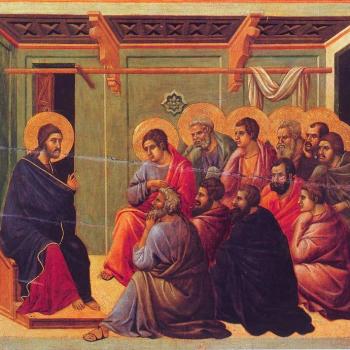
Adobe Stock
In the church of my youth, we were often taught that Paul’s wretched man (Romans 7) represented ‘the Christian life’. In this passage, Paul describes his own struggles with sin at great length, portraying himself as continually failing to overcome. The wretched man wrestles with two related agencies, the first of which is sin.
“For I know that good itself does not dwell in me, that is, in my sinful nature. For I have the desire to do what is good, but I cannot carry it out. For I do not do the good I want to do, but the evil I do not want to do—this I keep on doing. Now if I do what I do not want to do, it is no longer I who do it, but it is sin living in me that does it.”
The inward nature of Paul’s struggle is intense, circular, and self-critical. If someone expressed such torment to me today, I’d advise them to see a therapist as a matter of urgency.
The second agency Paul struggles with in Romans 7 is the Hebrew law. Romans 7:5-8,
“For when we were in the realm of the flesh, the sinful passions aroused by the law were at work in us, so that we bore fruit for death…What shall we say, then? Is the law sinful? Certainly not! Nevertheless, I would not have known what sin was had it not been for the law. For I would not have known what coveting really was if the law had not said, “You shall not covet.” But sin, seizing the opportunity afforded by the commandment, produced in me every kind of coveting. For apart from the law, sin was dead.”
Paul argues that before he heard the commandments, he lived freely. The law was meant to bring life, but simply knowing the commandment existed led to his inability to follow it, resulting in being mastered by sin. Romans 7:9-10,
"Once I was alive apart from the law; but when the commandment came, sin sprang to life and I died. I found that the very commandment that was intended to bring life actually brought death."
He argues that even though the law brought death to him, leaving in a state of perpetual struggle, it is still ultimately good because it made him aware of his need for mercy. Romans 7:13b,
“Nevertheless, in order that sin might be recognized as sin, it used what is good to bring about my death, so that through the commandment sin might become utterly sinful.”
The phrase, ‘that…sin might become utterly sinful’, is the key to understanding this entire passage on the wretched man. It isn’t solely about sin or solely about the law, but about the interaction of the two. The purpose of the law was to make us aware that it is impossible to behave our way to righteousness. Anyone attempting to earn the favour of God through works-righteousness is doomed to failure, just as Paul’s wretched man was. I would go so far as to say that a life lived under any code of righteous behaviour is one of endless struggle and futility.
“What a wretched man I am! Who will rescue me from this body that is subject to death? Thanks be to God, who delivers me through Jesus Christ our Lord!”
Who will deliver us from the struggle of self-righteousness? The one who offers us faith-righteousness, the free gift of God through Jesus Christ! By embracing the fact that we cannot earn the favour of God through perfect behaviour, we cast ourselves into the arms of grace. Our righteousness is found in Christ; it is not won by hard work.
Romans 7 is often taught in isolation from Romans 8, but there were no chapters in the original epistle. Romans 7 flows into Romans 8 as a natural train of thought, and Romans 8 makes it clear that through Christ, we can find freedom from harmful habits and attitudes (sin). Romans 8:1-3,
“Therefore, there is now no condemnation for those who are in Christ Jesus, because through Christ Jesus the law of the Spirit who gives life has set you free from the law of sin and death. For what the law was powerless to do because it was weakened by the flesh, God did by sending his own Son in the likeness of sinful flesh to be a sin offering.”
For what the law was powerless to do, God did by sending his son. In other words, the wretched man of Romans 7 is a picture of life under the law rather than a picture of the lives of Christian believers, while Romans 8 is precisely and explicitly about life in Christ – a crescendo that culminates is this glorious statement of faith:
“No, in all these things we are more than conquerors through him who loved us. For I am convinced that neither death nor life, neither angels nor demons, neither the present nor the future, nor any powers, neither height nor depth, nor anything else in all creation, will be able to separate us from the love of God that is in Christ Jesus our Lord.”
The teachers at my childhood church didn’t understand the promise of Romans 8, keeping their gaze squarely on Paul’s wretched man. I acknowledge that they were simply doing their best, grounded as they were in reformed theology, which paints us as grossly unacceptable to God, and God as a capricious, terrifying tyrant. That brand of Christian doctrine, manifesting most hideously as Calvinism, is a trap for every follower of Jesus.
Those who want to find their way out of drudgery can do so by re-examine the scriptures without all that filtering. Maybe form a group of seekers, courageously asking the difficult questions we are too often taught to avoid. My personal experience is that when we look at the scriptures with our hearts tuned in to the Holy Spirit, passages that lost their vitality long ago come alive again, full of fresh meaning. In my opinion, one of the keys to personal fulfilment is to free yourself from dogma. Such a journey can take a long time, but the destination is so much better than the starting point.
Note from the author:
I’m planning to write a book called Deconstructing in the Company of God. The purpose of the book is to provide insights into the process of deconstruction from the point of view of believers who know they need to go there but want to maintain their relationship with Jesus. I want to show how keeping close to the Lord during deconstruction is not only possible but the ideal way to do it. I intend to address some common pitfalls and offer gentle advice on how to avoid them, while supporting believers with insights and wisdom gained from doing things the hard way.
I need help to get this done. The book might take 3 months to write if I devoted myself to it, full time, but I’m a freelance writer and can’t afford to step away from my usual gigs. Readers who want this book to be written can help make that a reality by making a pledge or one-off donation on my Patreon page. I welcome every supporter and offer my thanks in advance for helping me bring this book to life.
“For I know that good itself does not dwell in me, that is, in my sinful nature. For I have the desire to do what is good, but I cannot carry it out. For I do not do the good I want to do, but the evil I do not want to do—this I keep on doing. Now if I do what I do not want to do, it is no longer I who do it, but it is sin living in me that does it.”
The inward nature of Paul’s struggle is intense, circular, and self-critical. If someone expressed such torment to me today, I’d advise them to see a therapist as a matter of urgency.
The second agency Paul struggles with in Romans 7 is the Hebrew law. Romans 7:5-8,
“For when we were in the realm of the flesh, the sinful passions aroused by the law were at work in us, so that we bore fruit for death…What shall we say, then? Is the law sinful? Certainly not! Nevertheless, I would not have known what sin was had it not been for the law. For I would not have known what coveting really was if the law had not said, “You shall not covet.” But sin, seizing the opportunity afforded by the commandment, produced in me every kind of coveting. For apart from the law, sin was dead.”
Paul argues that before he heard the commandments, he lived freely. The law was meant to bring life, but simply knowing the commandment existed led to his inability to follow it, resulting in being mastered by sin. Romans 7:9-10,
"Once I was alive apart from the law; but when the commandment came, sin sprang to life and I died. I found that the very commandment that was intended to bring life actually brought death."
He argues that even though the law brought death to him, leaving in a state of perpetual struggle, it is still ultimately good because it made him aware of his need for mercy. Romans 7:13b,
“Nevertheless, in order that sin might be recognized as sin, it used what is good to bring about my death, so that through the commandment sin might become utterly sinful.”
The phrase, ‘that…sin might become utterly sinful’, is the key to understanding this entire passage on the wretched man. It isn’t solely about sin or solely about the law, but about the interaction of the two. The purpose of the law was to make us aware that it is impossible to behave our way to righteousness. Anyone attempting to earn the favour of God through works-righteousness is doomed to failure, just as Paul’s wretched man was. I would go so far as to say that a life lived under any code of righteous behaviour is one of endless struggle and futility.
We are not the wretched man
Paul does not teach that the wretched man is a picture of life as a believer. Quite the opposite! Romans 7:24-25,“What a wretched man I am! Who will rescue me from this body that is subject to death? Thanks be to God, who delivers me through Jesus Christ our Lord!”
Who will deliver us from the struggle of self-righteousness? The one who offers us faith-righteousness, the free gift of God through Jesus Christ! By embracing the fact that we cannot earn the favour of God through perfect behaviour, we cast ourselves into the arms of grace. Our righteousness is found in Christ; it is not won by hard work.
Romans 7 is often taught in isolation from Romans 8, but there were no chapters in the original epistle. Romans 7 flows into Romans 8 as a natural train of thought, and Romans 8 makes it clear that through Christ, we can find freedom from harmful habits and attitudes (sin). Romans 8:1-3,
“Therefore, there is now no condemnation for those who are in Christ Jesus, because through Christ Jesus the law of the Spirit who gives life has set you free from the law of sin and death. For what the law was powerless to do because it was weakened by the flesh, God did by sending his own Son in the likeness of sinful flesh to be a sin offering.”
For what the law was powerless to do, God did by sending his son. In other words, the wretched man of Romans 7 is a picture of life under the law rather than a picture of the lives of Christian believers, while Romans 8 is precisely and explicitly about life in Christ – a crescendo that culminates is this glorious statement of faith:
“No, in all these things we are more than conquerors through him who loved us. For I am convinced that neither death nor life, neither angels nor demons, neither the present nor the future, nor any powers, neither height nor depth, nor anything else in all creation, will be able to separate us from the love of God that is in Christ Jesus our Lord.”
The teachers at my childhood church didn’t understand the promise of Romans 8, keeping their gaze squarely on Paul’s wretched man. I acknowledge that they were simply doing their best, grounded as they were in reformed theology, which paints us as grossly unacceptable to God, and God as a capricious, terrifying tyrant. That brand of Christian doctrine, manifesting most hideously as Calvinism, is a trap for every follower of Jesus.
Those who want to find their way out of drudgery can do so by re-examine the scriptures without all that filtering. Maybe form a group of seekers, courageously asking the difficult questions we are too often taught to avoid. My personal experience is that when we look at the scriptures with our hearts tuned in to the Holy Spirit, passages that lost their vitality long ago come alive again, full of fresh meaning. In my opinion, one of the keys to personal fulfilment is to free yourself from dogma. Such a journey can take a long time, but the destination is so much better than the starting point.
Note from the author:
I’m planning to write a book called Deconstructing in the Company of God. The purpose of the book is to provide insights into the process of deconstruction from the point of view of believers who know they need to go there but want to maintain their relationship with Jesus. I want to show how keeping close to the Lord during deconstruction is not only possible but the ideal way to do it. I intend to address some common pitfalls and offer gentle advice on how to avoid them, while supporting believers with insights and wisdom gained from doing things the hard way.
I need help to get this done. The book might take 3 months to write if I devoted myself to it, full time, but I’m a freelance writer and can’t afford to step away from my usual gigs. Readers who want this book to be written can help make that a reality by making a pledge or one-off donation on my Patreon page. I welcome every supporter and offer my thanks in advance for helping me bring this book to life.
8/1/2025 3:28:04 AM





